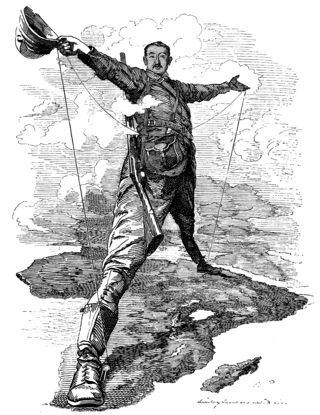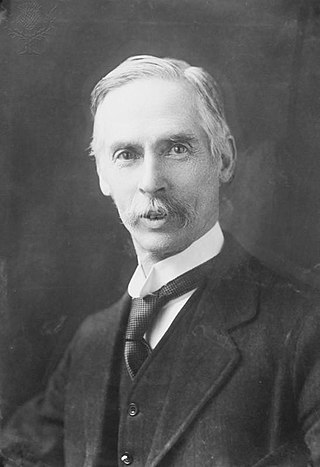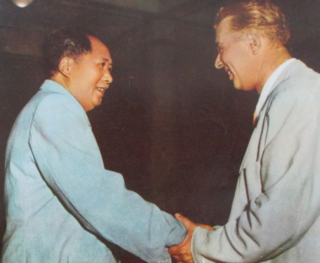
Cultural imperialism comprises the cultural dimensions of imperialism. The word "imperialism" describes practices in which a country engages culture to create and maintain unequal social and economic relationships among social groups. Cultural imperialism often uses wealth, media power and violence to implement the system of cultural hegemony that legitimizes imperialism.

Imperialism is the practice, theory or attitude of maintaining or extending power over foreign nations, particularly through expansionism, employing both hard power and soft power. Imperialism focuses on establishing or maintaining hegemony and a more or less formal empire. While related to the concepts of colonialism, imperialism is a distinct concept that can apply to other forms of expansion and many forms of government.

In historical contexts, New Imperialism characterizes a period of colonial expansion by European powers, the United States, and Japan during the late 19th and early 20th centuries. The period featured an unprecedented pursuit of overseas territorial acquisitions. At the time, states focused on building their empires with new technological advances and developments, expanding their territory through conquest, and exploiting the resources of the subjugated countries. During the era of New Imperialism, the European powers individually conquered almost all of Africa and parts of Asia. The new wave of imperialism reflected ongoing rivalries among the great powers, the economic desire for new resources and markets, and a "civilizing mission" ethos. Many of the colonies established during this era gained independence during the era of decolonization that followed World War II.

John Atkinson Hobson was an English economist and social scientist. Hobson is best known for his writing on imperialism, which influenced Vladimir Lenin, and his theory of underconsumption.
Neocolonialism is the continuation or reimposition of imperialist rule by a state over another nominally independent state. This is the continuation of colonial representations and realities which remain after formal colonisation has come to an end. Neocolonialism is the control of less-developed countries by developed countries through indirect means. The term neocolonialism was first used after World War II to refer to the continuing dependence of former colonies on foreign countries, but its meaning soon broadened to apply, more generally, to places where the power of developed countries was used to produce a colonial-like exploitation.Neocolonialism takes the form of economic imperialism, globalization, cultural imperialism and conditional aid to influence or control a developing country instead of the previous colonial methods of direct military control or indirect political control (hegemony).
Media imperialism is an area in the international political economy of communications research tradition that focuses on how "all Empires, in territorial or nonterritorial forms, rely upon communications technologies and mass media industries to expand and shore up their economic, geopolitical, and cultural influence." In the main, most media imperialism research examines how the unequal relations of economic, military and cultural power between an imperialist country and those on the receiving end of its influence tend to be expressed and perpetuated by mass media and cultural industries.
Linguistic imperialism or language imperialism is occasionally defined as "the transfer of a dominant language to other people". This language "transfer" comes about because of imperialism. The transfer is considered to be a sign of power; traditionally military power but also, in the modern world, economic power. Aspects of the dominant culture are usually transferred along with the language. In spatial terms, indigenous languages are employed in the function of official (state) languages in Eurasia, while only non-indigenous imperial (European) languages in the "Rest of the World". In the modern world, linguistic imperialism may also be considered in the context of international development, affecting the standard by which organizations like the International Monetary Fund and the World Bank evaluate the trustworthiness and value of structural adjustment loans by virtue of views that are commonly foregrounded in English-language discourse and not neutral.

"We will bury you" is a phrase that was used by Soviet First Secretary Nikita Khrushchev, the de facto ruler of the USSR, while addressing Western ambassadors at a reception at the Polish embassy in Moscow on November 18, 1956. The phrase was originally translated into English by Khrushchev's personal interpreter Viktor Sukhodrev. The phrase was received very negatively by contemporary Western audiences, but modern translators have suggested the phrase was mistranslated.

Ernest William Hobson FRS was an English mathematician, now remembered mostly for his books, some of which broke new ground in their coverage in English of topics from mathematical analysis. He was Sadleirian Professor of Pure Mathematics at the University of Cambridge from 1910 to 1931.

The Albanian–Chinese split or Sino–Albanian split was the gradual worsening of relations between the People's Socialist Republic of Albania and the People's Republic of China in the period 1972–1978.
A theory of capitalism describes the essential features of capitalism and how it functions. The history of various such theories is the subject of this article.

Imperialism: A Study (1902), by John A. Hobson, is a politico-economic discourse about the negative financial, economic, and moral aspects of imperialism as a nationalistic business enterprise. Hobson argues that capitalist business activity brought about imperialism.
Ultra-imperialism is a potential, comparatively peaceful phase of capitalism, meaning after or beyond imperialism. It was described mainly by Karl Kautsky. Post-imperialism is sometimes used as a synonym of ultra-imperialism, although it can have distinct meanings.

The Eastern Origins of Western Civilisation, written by the political scientist John M. Hobson in 2004, is a book that argues against the historical theory of the rise of the West after 1492 as a "virgin birth", but rather as a product of Western interactions with a more technically and socially advanced Eastern civilization.
David Kenneth Fieldhouse, FBA was an English historian of the British Empire. Fieldhouse was born to missionary parents in Mussoorie, northern India. He was sent to England for his education at Dean Close School, Cheltenham, from 1938 to 1943. Fieldhouse then completed naval service, before reading history at The Queen's College, Oxford.

Imperialism, the Highest Stage of Capitalism, originally published as Imperialism, the Newest Stage of Capitalism, is a book written by Vladimir Lenin in 1916 and published in 1917. It describes the formation of oligopoly, by the interlacing of bank and industrial capital, in order to create a financial oligarchy, and explains the function of financial capital in generating profits from the exploitation colonialism inherent to imperialism, as the final stage of capitalism. The essay synthesises Lenin's developments of Karl Marx's theories of political economy in Das Kapital (1867).
Maoism–Third Worldism (MTW) is a broad tendency which is mainly concerned with the infusion and synthesis of Marxism—particularly of the Marxist–Leninist–Maoist persuasion—with concepts of non-Marxist Third Worldism, namely dependency theory and world-systems theory.
Socialism in one country was a Soviet state policy to strengthen socialism within the country rather than socialism globally. Given the defeats of the 1917–1923 European communist revolutions, Joseph Stalin encouraged the theory of the possibility of constructing socialism in the Soviet Union. The theory was eventually adopted as Soviet state policy.

Anti-imperialism in political science and international relations is opposition to imperialism or neocolonialism. Anti-imperialist sentiment typically manifests as a political principle in independence struggles against intervention or influence from a global superpower, as well as in opposition to colonial rule. Anti-imperialism can also arise from a specific economic theory, such as in the Leninist interpretation of imperialism, which is derived from Lenin's 1917 work Imperialism, the Highest Stage of Capitalism. People who categorize themselves as anti-imperialists often state that they are opposed to colonialism, colonial empires, hegemony, imperialism and the territorial expansion of a country beyond its established borders.
The theory of imperialism refers to a range of theoretical approaches to understanding the expansion of capitalism into new areas, the unequal development of different countries, and economic systems that may lead to the dominance of some countries over others. These theories are considered distinct from other uses of the word imperialism which refer to the general tendency for empires throughout history to seek power and territorial expansion. The theory of imperialism is often associated with Marxist economics, but many theories were developed by non-Marxists. Most theories of imperialism, with the notable exception of ultra-imperialism, hold that imperialist exploitation leads to warfare, colonization, and international inequality.









